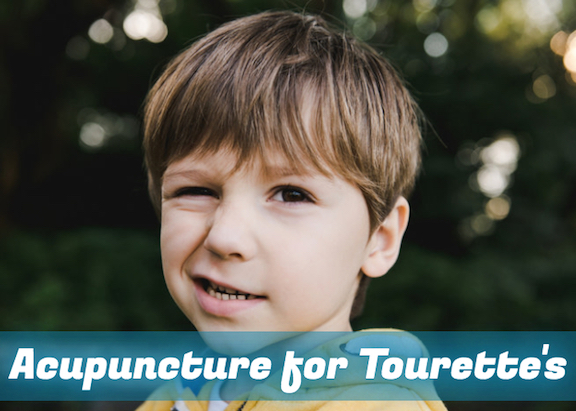Acupuncture for Tourette Syndrome is one that is gaining traction in the western medicine world because of its ability to quickly rectify tics experienced from it. Many people with Tourette Syndrome go undiagnosed. The Centers for Disease Control and Prevention found that 1 of every 360 children 6-17 years old in the United States received a Tourette Syndrome diagnosis roughly equating to about 138,000 children. This statistic suggests that about half of children with Tourette Syndrome are not diagnosed. Additionally, boys are 3-5 times as likely to have Tourette syndrome than girls, and children 12-17 years old are twice as likely to have Tourette Syndrome as children 6-11 years old. These numbers on top of usually being accompanied with additional disorder, Tourette Syndrome remains one that can be helped by alternative medicine like acupuncture.
Tourette Syndrome
Tourette (too-RET) Syndrome is a childhood-onset neuropsychiatric disorder that affects children and adults alike. It involves repetitive sounds or movements known as tics that cannot be easily controlled. As we said above, these tics usually show up in children between the ages of 2 and 15, but usually around the age of 6.
Types of Tics:
- Simple – brief, repetitive, and sudden that
involve a number of muscle groups.
- Motor – eye blinking, head jerking, shoulder
shrugging, eye darting, nose twitching, mouth movements.
- Vocal – coughing, grunting, throat clearing,
barking
- Motor – eye blinking, head jerking, shoulder
shrugging, eye darting, nose twitching, mouth movements.
- Complex – coordinated and distinct patterns of
movements involving several muscle groups.
- Motor – touching or smelling objects, stepping
in a certain pattern, repeating observed movements, obscene gesturing, bending
or twisting, hopping.
- Vocal – repeating one’s own or others’ words or phrases, using vulgar or obscene or swear words (known as coprolalia).
- Motor – touching or smelling objects, stepping
in a certain pattern, repeating observed movements, obscene gesturing, bending
or twisting, hopping.
Motor tics often appear before vocal tics, but the wide range of tics that sufferers experience is diverse. These tics can range from mild to severe, and if they do fall in the severe category, it can affect the person’s quality of life, daily functioning, and communication. Tics can also vary in type, frequency, or severity, worsen if the person is sick, tired, excited, anxious, or stressed, worsen in early teen years & improve upon entering adulthood, and occur during sleep. Before these tics begin, the person will likely feel an uncomfortable bodily urge such as an itch, tension, or tingle, and the expression of the tic will bring relief to that urge. Some people with Tourette Syndrome can, with a lot of effort, temporarily hold back or stop a tic.
The cause of Tourette Syndrome is unknown, and is likely, according to western medicine, caused by a combination of genetic and environmental components. Current experts suggest that there is an abnormality in the genes may play a role causing issues with the brain’s metabolism of neurotransmitters like serotonin, norepinephrine, and dopamine. Additionally, experts know that those who are afflicted with Tourette Syndrome often have another condition that either presents itself first or coexists with Tourette Syndrome.
Conditions often linked with Tourette Syndrome:
- Attention-Deficit/Hyperactivity Disorder (ADHD)
- Obsessive-Compulsive Disorder (OCD)
- Autism Spectrum Disorder
- Depression
- Anxiety disorders
- Pain (tic-related, usually headaches)
- Learning disabilities
- Sleep disorders
- Anger-management issues
Although there is no cure for Tourette’s, just like many other conditions, treatments are available. Luckily, many with Tourette Syndrome don’t need treatment unless their tics are troublesome.
Medications for Tourette Syndrome:
- Risperdal
- Zyprexa
- Navane
- Clozaril
- Ritalin (if the child has accompanying ADHD diagnosis)
All of these are to relieve tics of Tourette Syndrome patients. However, all of these drugs have limited effects, and can produce side-effects that are just as undesired and harmful as a tic, so alternative medicine such as acupuncture is sought out for this reason.
Acupuncture & Tourette Syndrome
Acupuncture has a successful long history dating back thousands of years for the treatment of the tics, vocal disturbances, and uncontrolled movements associated with Tourette Syndrome. Patients with Tourette Syndrome seek out acupuncture treatment because, as we stated above, conventional medications often times have little to no effect, and they are looking for a better clinical outcome to control their Tourette Syndrome.
In Traditional Chinese Medicine (TCM), Tourette Syndrome is known as an excess of yang due to deficiency in yin. What does that mean? Well, the concept of yin and yang in TCM is the foundation of understanding, diagnosing, and treating one’s health issues. We can think of this as matter and energy. Matter is anything that has mass and takes up space, while energy is the ability to change and do work. Essentially, matter and energy are yin and yang. In TCM terms, we want to balance the yin and yang (or matter and energy) in the body. This is done by increasing circulation and stabilizing neurotransmitters like serotonin and dopamine which are associated with Tourette Syndrome through acupuncture points and herbal medicine.
Acupuncture points for Tourette Syndrome:
- P6 – located on the forearm
- Yintang – located in between the eyes, at the
location where the “third eye” would be
- SP6 – located on the lower part of the outside
of the leg
- Sishencong – located on top of the head
- Xin – located on the ear (used for auricular
acupuncture)
- Shen Men – located on the ear (used for
auricular acupuncture)
- Liver – located on the ear (used for auricular acupuncture)
Additionally, your licensed acupuncturist may prescribe you an herbal formula to help with the tics that come with Tourette Syndrome.
Herbal formulas for Tourette Syndrome:
- Chou Dong Ling Chong Ji – this formula helps with tics and spasms. No contraindications
- Tong Xie Yao Fang – this formula helps with Tourette Syndrome as well, contraindicated for those with diarrhea.
Traditional Chinese Medicine can be extremely helpful with Tourette Syndrome. A case study was done in 2017, A Single Case of Tourette’s Syndrome Treated with Traditional Chinese Medicine, and it showed with a combination of herbs and acupuncture, the patient saw a 70% reduction of all symptoms. Additionally, in 2013, Miss Arizona Jennifer Smestad, has attributed her overcoming her issues with Tourette Syndrome to acupuncture and herbal medicine.
It is important to note to not take any of herbal formula or medicine without a consultation and prescription from your licensed acupuncture & herbal medicine provider.
Acupuncture for Treatment of Tourette Syndrome
Acupuncture has led many people with Tourette Syndrome to living virtually symptom-free lives without all the side-effects. Since there is not enough known about the cause of Tourette Syndrome, it is important to open the mind to alternative medicine because although people living with Tourette Syndrome generally lead healthy, active lives, it usually involves social and behavioral issues which can hurt the child’s (or adult’s) self-image. A 2016 systemic review, Acupuncture for Tourette Syndrome, concluded that acupuncture may have better short-term effect than western medicine for Tourette Syndrome in alleviating symptoms, and additionally an effective adjunct therapy in improving the effect of western medicine on Tourette Syndrome. Although there is a need for larger scale studies, this is tremendously positive, and only adds to the many accounts of positive feedback for acupuncture for the treatment of Tourette Syndrome.

Acupuncture Near Me
Get acupuncture near you today with Best Acupuncture Near Me, and contact a local acupuncture practitioner to find out if acupuncture is right for you.

